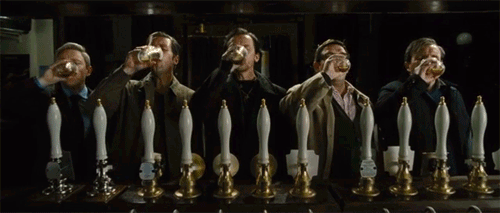Most of the time, alcohol have given us the confidence we need during some of the toughest situations in our lives. Whether it’s confessing love to someone else or performing in front of hundreds of people, alcohol can be the liquid courage we all need.

In a small study published in the Journal of Psychopharmacology, it also turns out that drinking can help us speak a second language more fluently, even when we don’t think we’re doing that well.
Researchers observed 50 native German speakers who were attending classes taught in Dutch, in a university in Netherlands where they recently passed a Dutch proficiency test. The study also indicated that all the participants were occasional alcohol drinkers.
Each volunteer engaged in a two-minute conversation with a Dutch interviewer—half of them were given alcohol and the other half were asked to drink water. The amount of alcohol given to each person varied on their weight (a pint of beer for a 150-pound man).

The conversations were reviewed by two native Dutch speakers who weren’t aware which among these people had consumed alcohol. The participants were also asked to rate themselves based on how fluently they think they spoke.
Those who drank alcohol thought that they didn’t do any better than those who just had water. They didn’t necessarily feel more confident in speaking Dutch more fluently.

But according to the native Dutch speakers, they actually performed better—citing that those who had alcohol spoke more fluently, and had better pronunciation than those who had water. Ratings for the two groups’ grammar and vocabulary were comparable.
Authors of the study pointed out, however, that the amount of alcohol played a huge role in the results of the study. They think that drinking too much can have the opposite effect on fluency and can even lead to slurred speech. The participants’ level of stress and emotional state, which can were not clear during the study, are also factors that can help or obstruct a person’s performance.
“Future research on this topic should include an alcohol placebo condition,” the authors write, “to disentangle the relative impact of pharmacological vs. expectancy effects.”

Well, don’t we speak all kinds of languages when we’re drunk?
Read more:
Science says sniffing your partner’s shirt helps reduce stress
Tell your second-born siblings, science says they are the “problem child” in the family
Apparently, talking to your pet is a sign of intelligence
Monkey study suggests louder males have smaller balls
Finally, a study proves that we heckin’ love dogs more than humans
Eye-rolling was a ‘survival tactic’ among women, evolutionary psychologists suggest
People who get goosebumps from music have unique brains, study suggests



